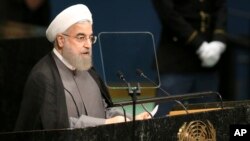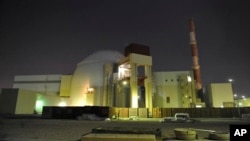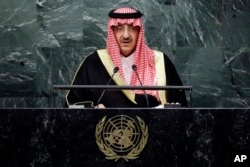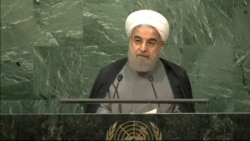Iran’s President Hassan Rouhani used his speech at the U.N. General Assembly to urge the United States to step up implementation of the landmark nuclear deal and to rebuke Saudi Arabia for its actions in the region.
“The lack of compliance with the JCPOA on the part of the United States in the past several months represents a flawed approach that should be rectified forthwith,” Rouhani told the annual gathering of leaders, using the abbreviation for the Joint Comprehensive Plan of Action. Iran and world powers agreed to the deal last year.
Tehran has been frustrated that foreign banks have shied away from dealing with the country. Rouhani also expressed his displeasure about an April decision from the U.S. Supreme Court. The court ruled that nearly $2 billion in frozen Iranian assets must be given to American families of victims of the 1983 bombing of a U.S. Marine Corps barracks in Lebanon and other attacks blamed on Iran.
“The U.S. is fully aware that JCPOA constitutes a recognized multilateral agreement, and any failure on the part of the United States in implementing it would constitute an international wrongful act and would be objected to by the international community,” Rouhani added, in what sounded like a warning to U.S. presidential candidates that they must respect the deal.
Republican hopeful Donald Trump has called the deal “a disgrace” and said sanctions should have been “doubled up.” Democratic nominee Hillary Clinton has said she would respect the agreement, but deal cautiously with Tehran.
Rouhani said the deal was a “win-win approach” and should serve as an example of how “complicated international problems” can be resolved diplomatically.
Thursday afternoon, foreign ministers of the six powers that negotiated the deal and Iran will meet to discuss implementation.
Regional rivals
The Iranian leader also used his speech to criticize rival regional power Saudi Arabia, with whom Tehran is fighting a proxy war.
“The defenseless people of Yemen are subjected to daily aerial bombardment,” he said.
Iran’s Shi’ite government and Saudi Arabia’s Wahhabi Sunni tradition of Islam often put the two at loggerheads.
“If the Saudi government is serious about its vision for development and regional security, it must cease and desist from divisive policies, spread of hate ideology and trampling upon the rights of neighbors,” Rouhani said. “Undoubtedly, if the region is to reverse the current dangerous trend into one towards development and stability, certain countries must stop bombing their neighbors, and abandon supporting Takfiri terrorist groups; and, while accepting responsibility, try to compensate for past mistakes."
Tehran has widely used the Takfiri term for militant groups that may have links with regional Sunni states such as Saudi Arabia.
In his address Wednesday to the assembly, Saudi Arabia’s Crown Prince Mohammed bin Nayef al Saud lashed out at Tehran for its support of “terrorist militia groups” in Bahrain, Kuwait, Yemen, Iraq, Syria and Lebanon.
“The region is facing a serious danger of destabilizing its security,” the crown prince said.
Saud called upon Tehran to “begin to build positive relations with its neighbors on the basis of the principles of good-neighborliness and non-interference in the internal affairs of other states.”
Iran’s Rouhani was restrained in his comments on another regional rival — Israel. He made only two passing remarks about the “Zionist” regime — one having to do with the occupation of Palestinian lands. His language was mild compared to his predecessor, Mahmoud Ahmadinejad, who once called for Israel to be "wiped off the face of the earth".
And while Rouhani referred to the war in Syria, saying “millions of Syrians are stranded in deserts and high seas and hundreds of thousands of them are subjected to violent deaths,” he did not criticize the government of his ally, President Bashar al-Assad, for the violence.
President Rouhani addresses security strategy:









